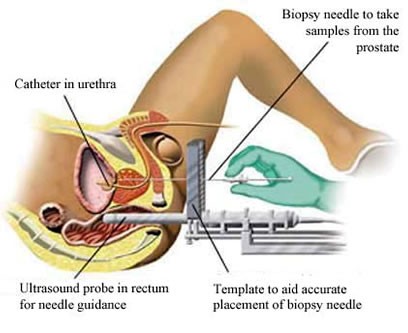A TP biopsy of the prostate is a procedure where the prostate is tested for the presence of cancer. TP stands for “transperineal”. The procedure is generally recommended for men who have a significant risk of having prostate cancer and are of an age group where treatment to cure the prostate cancer would be considered. In most cases, this means that the men will be between 40 and 75. Sometimes, older men are also recommended to undergo this test to see whether or not non-curative treatments, such as hormonal therapy, should be recommended. Most men who are recommended to undergo the test will have either a high prostate specific antigen (PSA) or an abnormal feeling prostate on rectal examination, or both.
The TP biopsy is performed under general anaesthetic as a day procedure. This means that the men who have the procedure will have no memory of undergoing this procedure and will not suffer any discomfort. Therefore, the procedure is done in conjunction with an anaesthetist in a hospital theatre. The anaesthetist will give antibiotics at the time of the biopsy. Serious infection is extremely rare compared to a transrectal ultrasound guided biopsy (TRUS Biopsy).
WHAT DOES THE SURGERY INVOLVE?
Once the medication to cause sedation is given the procedure involves performing a digital examination followed by inserting the ultrasound probe into the rectum via the anus. The probe is a similar size to the finger. The ultrasound probe allows visualisation of the prostate and the biopsies can then be taken using a special needle, which takes a small core of tissue. The needle is passed through the perineum (skin between the scrotum and the anus) using a special guidance template.

The number of biopsies taken depends on the size of the prostate. These are sent to the laboratory to be analysed for the presence of cancer by a specialist pathologist. The patient generally wakes up a few minutes after the procedure has been completed and will have no memory of the procedure-taking place. After an hour or so in recovery and provided they have passed urine, the patient will be discharged home and a follow-up appointment for one or two weeks will be made to see your Doctor in the rooms to discuss the results.
WHAT CAN I EXPECT AFTER THE PROCEDURE?
The majority of patients have no problems at all but it is important that you understand what may happen.
- Urethral bleeding – most men do pass a small amount of blood in the urine or leak blood from their penis after this procedure for up to 4-6 weeks.
- Haematospermia – blood in the semen or dark staining of the semen can persist for up to 3 months after the procedure. There is nothing to be concerned about and sexual activity can continue as normal.
WHAT ABOUT DIET?
- Drink plenty of fluids (8-10 glasses or 2-3 litres)
- Eat a diet high in fibre to prevent the need for straining when using your bowels
WHAT ABOUT EXERCISE/ACTIVITY?
- Avoid strenuous activity, heavy lifting or engage in sports for the next day unless otherwise instructed by your doctor
- Avoid driving a car, motorcycle or ride a bike for 24 hours after your procedure and do not walk home or travel alone by public transport
- Sexual activity can resume as normal (see Haematospermia above)
WHAT ABOUT MEDICATIONS?
- You can resume your usual medications
- If your blood thinning medication was stopped, your Doctor will let you know when to recommence
- You can take 1-2 paracetamol every 4-6 hours for pain and discomfort (no more than 8 in a day)
WHAT ARE THE POSSIBLE COMPLICATIONS?
- Urinary retention – occasionally patients will have difficulty passing urine after the procedure. It may be due to temporary swelling of the prostate or blood clots. Symptoms consist of abdominal pain, poor flow or frequent small urination. This usually occurs in older men with larger prostates. If this happens go to your closest Emergency Department.
- Infection (bladder or prostate) – this is rare with the TP approach. Symptoms include difficulty urinating, burning on urination, frequent urination or fevers. If this occurs contact GM Urology, your GP or the Emergency Department.
- Sepsis – is a severe form of infection and is otherwise known as blood poisoning. This is extremely rare (less than 1 in 1000) after a TP biopsy and is the major advantage over a TRUS Biopsy of the prostate. The symptoms consist of fevers, chills, shaking, lethargy, warm skin, shortness of breath, rapid heartbeat, drowsiness and a general feeling of being unwell. If this occurs you need to seek immediate medical attention at an Emergency Department.
- Erectile dysfunction – as the nerves for erections run close to the prostate, problems with erections can may occur post-biopsy. This is uncommon and usually temporary, but very rarely it may persist.
NOTIFY GM UROLOGY or your GP if you experience any of the following:
- You have difficulty passing urine, can only pass small amounts the flow stops completely.
- The bleeding is so heavy the urine looks like pure blood.
- The bleeding is accompanied by a fever or an increase in the discomfort when passing urine.
- You experience symptoms such as fevers, chills, shaking, lethargy, warm skin, shortness of breath, rapid heartbeat, drowsiness or a general feeling of being unwell.
FOLLOW UP APPOINTMENT
Your follow up appointment is usually organised at the same time you procedure is booked. If an appointment time is not given to you on discharge from hospital, you will need to phone GM Urology to make an appointment.
If you have any queries please contact GM Urology on 03 5201 7000 during business hours OR leave a message on the After Hours Urology Paging Service 03 9387 1000



